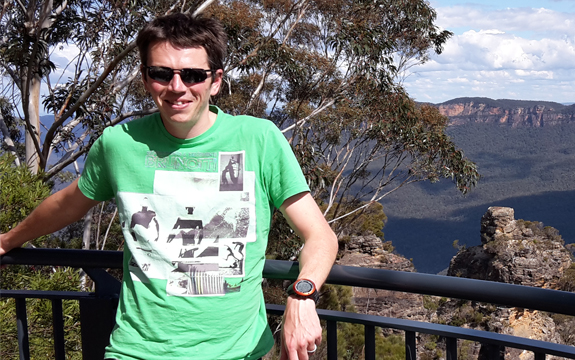Future Fellowship funding brings researcher back to Swinburne

In Summary
- Dr Adam Deller receives Future Fellowship to study astronomy at Swinburne
- Dr Deller completed his undergraduate and postgraduate at Swinburne, before heading overseas to continue his research
- His Fellowship will see him return to Swinburne in 2016
Dr Adam Deller recently received funding from the Australian Research Council to undertake a Future Fellowship at Swinburne University of Technology. After completing his undergraduate and postgraduate degrees at Swinburne, Dr Deller moved overseas to continue his research. Eight years later, he is now returning.
Dr Deller didn’t plan to have a career in astronomy.
‘As a kid, I lived in the country where there was very little pollution and usually clear night skies, so I was always casually interested in astronomy,’ Dr Deller says.
But it wasn't until he came to university that he began to develop a passion for studying the cosmos.
‘I was always interested in pursuing a research career and I was attracted to Swinburne’s double degree in science and engineering.’
During his degree, Dr Deller worked on two projects with the Centre for Astrophysics and Supercomputing and wrote a journal article with his supervisor.
‘As I started to get some exposure to actual research, I found that my computing and engineering skills could do cool things when applied to astronomy. That was when I started to think about astronomy as a career.’
After enrolling in his PhD at Swinburne, Dr Deller had a moment where he realised that astronomy was definitely what he wanted to do.
‘Quite early in my PhD, I made a radio image of some unimportant galaxy, that we happened to be using as a calibrator source. Casually, my supervisor told me, "you know, right now, this is almost certainly the first radio image ever made of this galaxy - we're the first people to see it this way." That was really a buzz, and it was around then that I began to be fairly sure that I wanted to continue in astronomy permanently.’
After completing his PhD, Dr Deller went on to work in a variety of research roles in the USA and Europe, building on the work he had done in his PhD.
‘I have spent time at National Radio Astronomy Observatory in the USA and the Netherlands Institute for Radio Astronomy, where I have been continuing my development work on digital instrumentation for radio interferometers, making high-sensitivity astrometric observations of neutron stars and commissioning new instruments capable of high resolution imaging at very low radio frequencies.
After receiving his Future Fellowship earlier this week, Dr Deller will return to Swinburne in 2016, where he will be researching Fast Radio Bursts (FRBs).
‘FRBs are enigmatic flashes of radio emission that appear to originate from outside our Galaxy. To date no-one has been able to figure out what is generating these brief yet spectacularly bright radio flashes.
‘My project is to extend the UTMOST instrument on the Molonglo telescope by adding "outrigger" stations that will enable us to pinpoint the location of the bursts. By associating bursts with host galaxies, we can determine a huge amount of information, like the average density of the extremely tenuous gas between galaxies and the nature of the objects that generate the radio emission.’
Dr Deller said that he is looking forward to returning to Swinburne, the university that kick-started his career as an international researcher.
‘Between undergrad and postgrad, I spent eight years at Swinburne, so in a sense it is like coming home!
‘While I’ve been overseas I've kept up active collaborations with researchers at Swinburne and visited quite a few times, so I know the atmosphere there is great, perfect for my project. I'm very keen to jump back in!’

